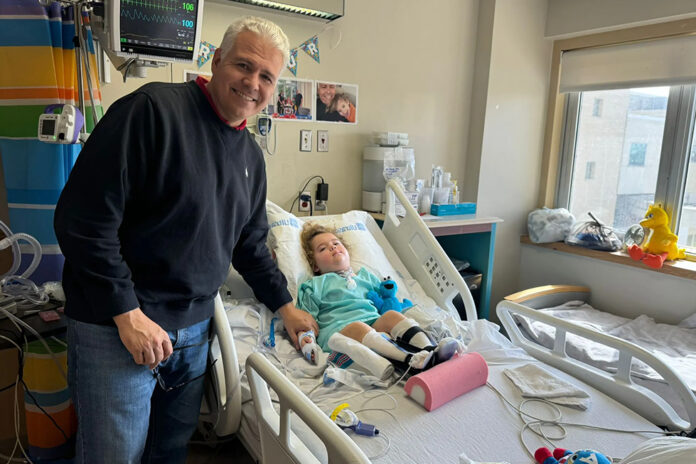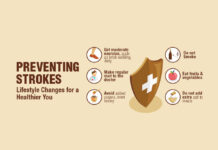
A stark reflection on Canada’s healthcare rigidity and the power of a father’s love
In a story that has left many Canadians both heartbroken and outraged, Nicolas Tetrault, a Quebec father, was forced to seek medical care for his two-and-a-half-year-old son Arthur in the United States after doctors in Montreal seemed to dismiss any hope of the boy’s recovery. This is not just a story about one father’s desperate fight—it is a glaring spotlight on the failures of the Canadian healthcare system, one that prioritizes regulations over hope and leaves families in despair when they most need support.
The harrowing incident began in October 2024, when young Arthur was discovered in the pool of a rental home in Ile-Bizard, a suburb of Montreal. Rushed to Lakeshore General Hospital and later transferred to Montreal Children’s Hospital, the little boy’s condition was dire. What followed was a series of devastating conversations that no parent should have to endure.
According to Tetrault, the doctors concluded that Arthur’s chances of survival were slim to none. The prognosis was bleak: Arthur would likely remain in a vegetative state, dependent on life support indefinitely. Yet, for a father who refused to give up on his son, this wasn’t an acceptable answer.
A System That Discourages Hope
Tetrault’s dissatisfaction with the Canadian healthcare approach grew as he researched potential alternative treatments for drowning victims. His efforts led him to the work of Dr. Paul Harch, a Louisiana-based specialist in hyperbaric oxygen therapy. Dr. Harch has had significant success in treating brain injuries, including cases involving drowning, claiming that up to 85% of severely affected children show signs of improvement with this therapy.
However, when Tetrault proposed hyperbaric oxygen treatment to the Montreal doctors, he was met with scorn and dismissal. “They said it’s witchcraft, that doctors in the U.S. are imbeciles,” Tetrault recalls. Their refusal to even consider the treatment highlights a concerning rigidity in Canada’s medical system, one where innovative approaches are often dismissed outright if they don’t align with established protocols. Hyperbaric treatment, not approved by Health Canada for drowning victims, was categorically rejected.
This rigid adherence to regulatory guidelines over individual care has been criticized by medical malpractice lawyers like Patrick Martin-Menard, who pointed out the system’s lack of a customer service-oriented approach. The culture in Quebec’s healthcare, according to Martin-Menard, is one where patients are treated as burdens rather than as clients deserving of respect and care.
Crossing Borders for a Second Chance
Determined not to give up, Tetrault took matters into his own hands. He managed to get Arthur admitted to Ochsner Medical Center in New Orleans, where the little boy began receiving hyperbaric oxygen therapy. Tetrault described the experience in the U.S. as “a million times better,” emphasizing the stark contrast between how he was treated as a parent in the two countries.
“In the U.S., parents are treated as clients, whereas in Montreal, we were seen as a source of expense,” Tetrault lamented. This comparison lays bare the deep flaws in the Canadian system: while universal healthcare may be free, it often comes at the cost of compassion and flexibility.
Hope, At a High Price
Despite the glimmer of hope provided by the treatment in New Orleans, the journey has come with an immense financial burden. Tetrault estimates that the total medical expenses will exceed six figures—a sum that many families would find insurmountable. Yet, for the first time since the incident, he can finally sleep at night, buoyed by the possibility that Arthur might recover, even if just a little.
Meanwhile, back in Canada, the official stance remains unchanged. Christine Bouthillier, communications director at the Montreal Children’s Hospital, reiterated that hyperbaric oxygen therapy is not indicated for post-drowning oxygen deprivation and is therefore not offered in Quebec. Cardiologist Dr. Christopher Labos echoed the sentiment, stating that while hyperbaric treatment has approved uses, drowning cases are not one of them.
A Father’s Mission
Whether Arthur regains his ability to walk or talk remains uncertain, but Tetrault’s love for his son and his refusal to accept defeat has captured hearts across the internet, where his posts documenting Arthur’s journey have gone viral. Beyond his fight, Tetrault now aims to dedicate part of his life to advocating for drowning victims and ensuring that they have access to alternative treatments like hyperbaric oxygen therapy.
A Call for Compassion and Reform
This story is not just about Arthur—it’s about a healthcare system that failed to provide even a glimmer of hope. It’s about the need for reform in Quebec and across Canada, where rigid policies often leave patients and families feeling powerless. Tetrault’s journey serves as a reminder that medicine is not just about science—it’s about humanity, compassion, and the willingness to explore new possibilities.
As we follow Arthur’s path to recovery, let us also reflect on the systemic changes needed to prevent other families from facing the same ordeal. Quebec and Canada must do better. For Arthur. For every child. For hope.











